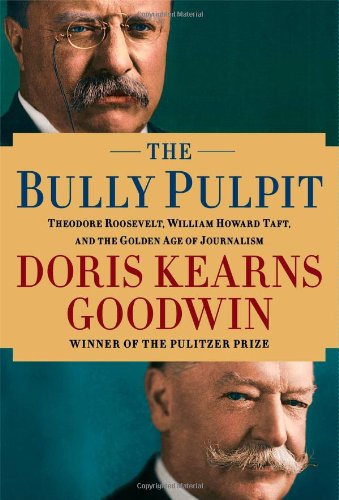The Bully Pulpit: Theodore Roosevelt, William Howard Taft, and the Golden Age of Journalism
The gap between rich and poor has never been wider . . . legislative stalemate paralyzes the country . . . corporations resist federal regulations . . . spectacular mergers produce giant companies . . . the influence of money in politics deepens . . . bombs explode in crowded streets . . . small
The gap between rich and poor has never been wider . . . legislative stalemate paralyzes the country . . . corporations resist federal regulations . . . spectacular mergers produce giant companies . . . the influence of money in politics deepens . . . bombs explode in crowded streets . . . small wars proliferate far from our shores . . . a dizzying array of inventions speeds the pace of daily life.
These unnervingly familiar headlines serve as the backdrop for Doris Kearns Goodwin’s highly anticipated The Bully Pulpit—a dynamic history of the first decade of the Progressive era, that tumultuous time when the nation was coming unseamed and reform was in the air.
The story is told through the intense friendship of Theodore Roosevelt and William Howard Taft—a close relationship that strengthens both men before it ruptures in 1912, when they engage in a brutal fight for the presidential nomination that divides their wives, their children, and their closest friends, while crippling the progressive wing of the Republican Party, causing Democrat Woodrow Wilson to be elected, and changing the country’s history.
The Bully Pulpit is also the story of the muckraking press, which arouses the spirit of reform that helps Roosevelt push the government to shed its laissez-faire attitude toward robber barons, corrupt politicians, and corporate exploiters of our natural resources. The muckrakers are portrayed through the greatest group of journalists ever assembled at one magazine—Ida Tarbell, Ray Stannard Baker, Lincoln Steffens, and William Allen White—teamed under the mercurial genius of publisher S. S. McClure.
Goodwin’s narrative is founded upon a wealth of primary materials. The correspondence of more than four hundred letters between Roosevelt and Taft begins in their early thirties and ends only months before Roosevelt’s death. Edith Roosevelt and Nellie Taft kept diaries. The muckrakers wrote hundreds of letters to one another, kept journals, and wrote their memoirs. The letters of Captain Archie Butt, who served as a personal aide to both Roosevelt and Taft, provide an intimate view of both men.
The Bully Pulpit, like Goodwin’s brilliant chronicles of the Civil War and World War II, exquisitely demonstrates her distinctive ability to combine scholarly rigor with accessibility. It is a major work of history—an examination of leadership in a rare moment of activism and reform that brought the country closer to its founding ideals.An Amazon Best Book of the Month, November 2013: In an era when cooperation between the national media and the US government seems laughable, Pulitzer Prize-winning historian Doris Kearns Goodwin’s timely 100-year look backward explores the origins of the type of muckraking journalism that helped make America a better country. Focusing on the presidencies of Theodore Roosevelt and his successor, William Howard Taft–one-time colleagues and friends who later became sworn foes–Goodwin chronicles the birth of an activist press, which occurred when five of the nation’s best-ever journalists converged at McClure’s magazine and helped usher in the Progressive era. At times slow and overly meticulous, with a lot of backstory and historical minutiae, this is nonetheless a lush, lively, and surprisingly urgent story–a series of entwined stories, actually, with headstrong and irascible characters who had me pining for journalism’s earlier days. It’s a big book that cries out for a weekend in a cabin, a book to get fully lost in, to hole up with and ignore the modern world, to experience the days when newsmen and women were our heroes. –Neal Thompson







Comments